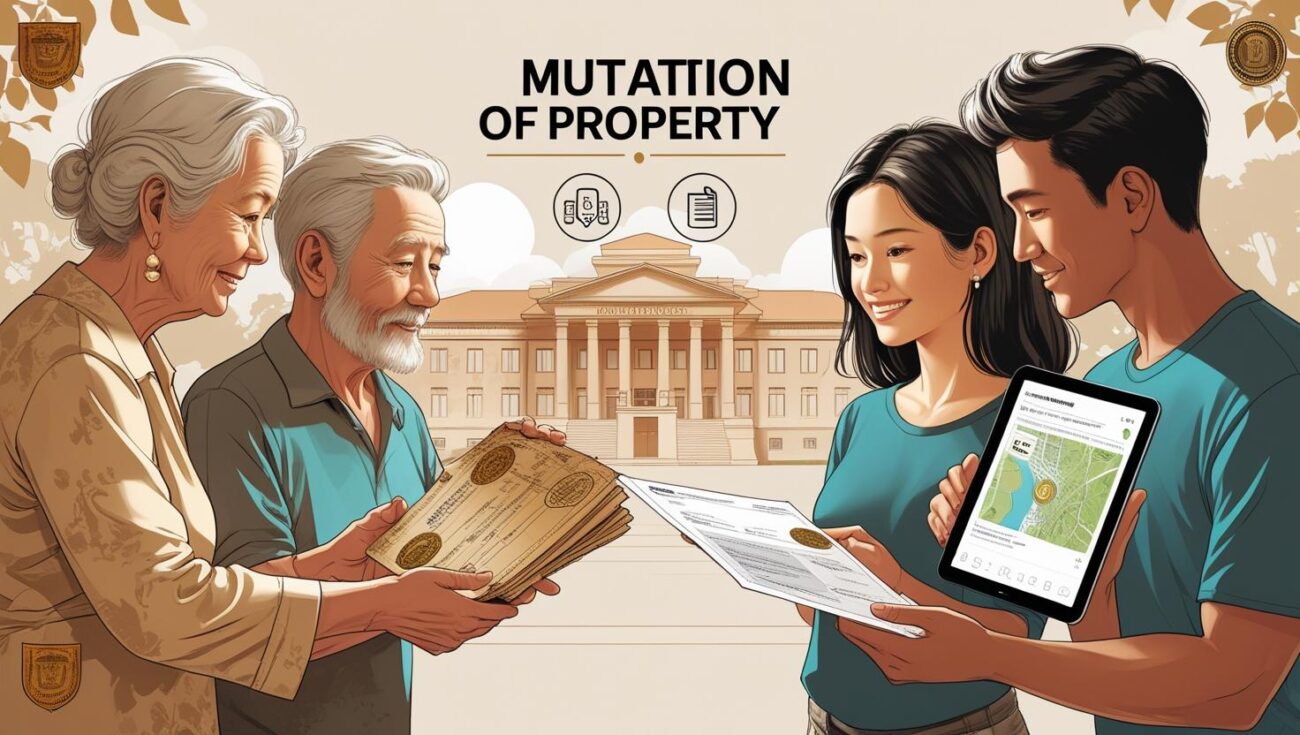What is Mutation of Property?
Mutation of property is a formal process that facilitates a change in government land revenue records of a particular property or land. At the time when property is acquired or transferred (through selling, inheritance, gifting, or a court ruling), it is necessary to update the concerned government department. This is to ensure that the name of the new owner is updated in the land records of the relevant revenue department.
Although the process of mutation is of no significance, in isolation, it does serve to provide considerable legal and administrative value. A mutation certificate is usually issued after this process which is evidence of the updated ownership and is useful for taxation, utility services, and management of the property. A property buyer or a legal heir without undergoing the mutation process, will run into challenges asserting legal ownership or performing transactions in the property in the future.
Why Mutation of Property is Required
Recognizing mutation of property aids in legal compliance. Most importantly, it offers recognition of the new owner of the property by the revenue department records. This is important for the assessment of property tax and for availing other of municipal services and utility services like electricity and gas.
Moreover, mutation helps prevent legal conflicts by keeping a documented and transparent record of ownership. If ownership mutation is not applied following a sale or inheritance, potential heirs or buyers may challenge legal ownership. It also becomes mandatory when applying for bank loans, selling the property, or enhancing the property because financial institutions and regulatory bodies often require a mutation certificate as part of their verification processes.
Mutation Law in Pakistan
The mutation law in Pakistan is governed by the respective provincial land revenue acts. Each province follows slightly different procedures, but the core concept remains the same: updating ownership records after a property transfer. In Punjab, the Punjab Land Records Authority (PLRA) manages this process and has digitized much of the system for public ease.
By law, any kind of property transaction, be it a sale deed, gift, inheritance, or a transfer via a court order, needs to be documented through a mutation process. This is done to maintain the integrity of land records and to ensure responsible management of the properties. In the case of inheritance, heirs are bound to provide legally appropriate documents to the provincial court to start the mutation process. Not following the mutation process can result in a number of legal issues, complications in taxation, and disputes over ownership.

Who Needs Mutation of Property
Anyone who has received a property via sale, inheritance, gift, partition, court decision, or any legally documented means must apply for mutation. This includes:
- Buyers and transferees, even if they hold a registered sale deed.
- Heirs and legatees, when inheritance or wills result in ownership change.
- Recipients of gifts, through registered gift deeds or part of settlement agreements.
- Beneficiaries of court directives, such as recovery or family division orders.
Mutation is not just about civil compliance—it’s a safeguard. By physically linking ownership changes to the public revenue record, the state prevents future fraudulent sale attempts, misallocation of utility services, and tax evasion.
Documents Required for Mutation
When applying for a mutation of property, applicants must present certain legal documents pertaining to ownership change to initiate the procedure. This includes the marriage or death certificate along with the succession or legal heir certificate if applicable. For a simple gift, partition, or a court ordered transfer, corresponding registered documents are to be submitted. A verified extract of land ownership, commonly known as Fard-e-Malkiat, must also be provided to establish the rightful owner listed in the official land records.
For transfers not within the family, NOC along with some other documents like recent tax clearance receipts, utility bills, and documents proving there are no pending dues with the property are needed. Due to particlar mutation laws in Pakistan and tunable policies in Punjab, documents submission is now allowed through the PLRA’s portals. Filing in the documents with the right sequence is equally as important as using the right documents in order to avoid delays in the mutation of property procedure.
Step-by-Step Mutation Process
Applying for a mutation petition in Punjab involves making an application in person or online through the relevant Tehsil office, depending on the province. For Punjab, online submission is made through the Easy Jamabandi portal. In Easy Jamabandi, applicants can make payments for mutation fees, which in Punjab is set at a minimum fee and is fixed by the Board of Revenue.
Once the mutation of property application and documents are submitted, revenue officers such as the Patwari and Kanungo verify the details. Sometimes, a site inspection is carried out to verify the property details. A public notice is then issued to allow for objections. If no objections arise—or once any are resolved by the Tehsildar—the mutation is approved, and the new owner’s name is updated in official land records.
On the issuing of final approval, a mutation certificate is issued which in Pakistan is the formal certificate issued after a person is muted. Though a mutation certificate lacks the status of a title deed, its usefulness is paramount indeed for ensuring debts, transfers of property, and other relevant transactions.

Mutation Fee in Punjab
In Punjab, the mutation fee is set at a nominal rate, aimed at reducing corruption and ensuring the process is affordable for all citizens. As such, the Board of Revenue Punjab has issued a circular for the felony of mutation of the property which in itself is a crime. As a broad rule, the fee curbed a minor amount set aside for a Patwari, Kanungo, and Tehsildar, and collection through service centers.
These fees cater at serving the bare minimum as opposed to cost recovery for the service to help both the rural and urban populations. However, it is critical to mention that mutation fees are distinct from other fees that pertain to the property such as stamp duty, registration fee, or capital value tax which is charged depending upon the nature of the transaction and location of the property. To put it in simple words, mutation fee is an incentive in Punjab which serves to promote registration of ownership transfers which in turn enhances the overall quality of the land record system.
Understanding the Mutation Certificate
After completing the mutation process, the local land revenue office issues a mutation certificate, a document that confirms the mutation process has been completed, a change of ownership has taken place, and the new owner’s name has been added to the land record kept by the government. For legal or administrative tasks like utility registration, property tax payments, or selling the property in the future, the mutation certificate is a vital document.
The mutation certificate, however, serves as an important document for legal processes but does not serve as a title deed. While it is important for the owner to have it, the actual title is not the certificate of mutation but the original sale deed, gift deed, or inheritance certificate. In any case, the certificate of mutation is vital for managing property issues and disputes.
Conclusion
In Pakistan’s land revenue system, the mutation of property is central to the legal recognition for the transfer of ownership. It integrates the actual legal steps: sale, inheritance, or gift with government acknowledgment. For better mutation law compliance and property record updates and maintenance in Pakistan, clear legal guidelines are emphasized and provided for individuals.
The low cost of mutations in Punjab has made this process accessible and straightforward. Issuance of the mutation certificate updates the name of the new owner for tax and utility services ensuring his name is documented. Finally, the answer to why is the mutation of property necessary is to secure legitimate ownership, facilitate future dealings, and minimize the chances of disputes.


